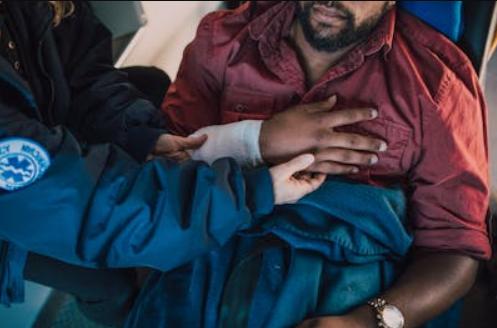
The journey of recovery after an accident can be both physically and emotionally challenging. Individuals often face the physical pain of injuries and the psychological toll that such events can impose.
While an accident care and treatment center plays a crucial role in providing essential rehabilitation, faith-based recovery methods complement traditional therapy. Integrating faith with therapeutic practices can provide a holistic approach to healing, addressing the body, mind, and spirit.
This article explores how faith and therapy can work together in post-accident recovery. It will highlight the benefits of spiritual support, emotional healing, and complementary therapies.
The profound impact of the mind-body-spirit connection on recovery from accidents cannot be overstated. As Verywell Mind emphasizes, "spirituality" encompasses a broader sense of connection – to oneself, others, and the world. This connection, whether rooted in religion or personal belief, has a significant impact on well-being.
Research consistently demonstrates that individuals with strong spiritual practices often experience improved recovery outcomes, including reduced anxiety, better pain management, and enhanced emotional resilience.
Faith provides a vital framework of meaning and hope during the challenging recovery period following an accident. It offers emotional support, promotes community connections, and instills a sense of purpose, all of which can help patients maintain a positive outlook.
Spiritual practices have been shown to reduce stress levels, improve sleep quality, and enhance overall well-being. These practices complement medical treatments by promoting relaxation and cultivating a mindset essential for healing.
An example of faith's role in healing can be seen through the experiences of Samantha Flores and Amanda Marino, nursing students at Fairfield University. During the Order of Malta’s 66th International Lourdes Pilgrimage, they witnessed firsthand the transformative power of faith.
At the sanctuary baths, participants received water from the spring in a ritual that symbolizes healing. They observed a young malade who, after receiving the water, gained strength and increased mobility—transformations that were previously thought impossible.
Marino reflected on this experience, emphasizing how it highlighted the interconnectedness of spirituality and healing. These moments reinforce the notion that healing goes beyond physical treatment to include emotional and spiritual aspects as well.
An effective recovery after an accident requires a multidisciplinary approach that integrates various forms of care, addressing both physical and emotional needs.
Medical care: Addressing physical injuries is essential, and therapies like physical therapy, chiropractic care, and occupational therapy play a critical role. According to the Denver Integrated Spine Center, chiropractic adjustments can improve the range of motion and enhance the nervous system’s health. Chiropractic care is a non-invasive, holistic method that can accelerate recovery, helping individuals regain functionality after an accident.
Psychological therapy: Emotional and psychological challenges are equally important in the healing process. Cognitive-behavioral therapy (CBT), trauma-focused therapy, and support groups assist patients in managing stress, anxiety, and trauma. These therapies create a safe environment for individuals to process their emotions and develop coping strategies.
Spiritual guidance: Spiritual support through chaplains, spiritual counselors, or faith-based communities offers comfort and encouragement. Faith can provide emotional strength and help individuals maintain hope throughout their recovery journey, ensuring holistic healing. By integrating medical, psychological, and spiritual care, individuals experience a more balanced and comprehensive recovery process.
The power of community support, particularly within faith-based organizations, cannot be overstated in post-accident recovery. As FEMA emphasizes, these organizations are vital partners in building community resilience. They serve diverse segments of the population, providing spiritual guidance and critical practical support such as meal deliveries and transportation assistance.
This network of support can significantly impact recovery outcomes. By combating feelings of isolation and depression that often accompany long-term recovery, faith communities provide a sense of belonging and shared purpose.
Faith-based counseling services provide a unique framework for addressing trauma and recovery by combining clinical expertise with spiritual guidance. According to Forbes, faith supports a sense of purpose, reducing depression and anxiety.
This observation is supported by research, which found that religiosity and spirituality are positively related to optimism, self-esteem, and hope. Additionally, these factors contribute to better coping with adversity and are associated with lower suicidal tendencies and psychotic disorders.
These counseling services help patients process their accident experiences through both psychological and spiritual lenses. For individuals whose faith is central to their identity, this integrated approach provides a familiar and meaningful context for healing.
Developing personal healing rituals that combine physical therapy exercises with spiritual practices can enhance the recovery process. These might include starting each therapy session with a prayer or meditation, setting intention-based healing goals, or incorporating grateful acknowledgment of progress.
Such rituals can help patients maintain focus on their recovery while nurturing their spiritual well-being.
Look for facilities that advertise holistic or integrative care approaches. Contact local religious organizations for recommendations of healthcare providers who are open to incorporating spiritual practices. Many hospitals and rehabilitation centers now have spiritual care departments that can help coordinate faith-sensitive treatment plans.
No, incorporating faith-based practices should enhance rather than hinder physical recovery. These practices are designed to complement, not replace, standard medical treatments. They can actually support better outcomes by reducing stress, improving mental health, and increasing treatment adherence.
Professional healthcare providers should respect your religious beliefs regardless of their own faith background. Be open about your spiritual needs and preferences, and work with your provider to find ways to incorporate your practices into your treatment plan. If needed, you can request a referral to a provider who better understands your faith-based needs.
The integration of faith and therapy in post-accident recovery represents a powerful approach to healing that addresses both physical and spiritual needs. By recognizing the interconnected nature of physical and spiritual well-being, healthcare providers can offer more comprehensive and effective treatment plans.
As healthcare continues to evolve, the importance of addressing both physical and spiritual aspects of recovery becomes increasingly clear.